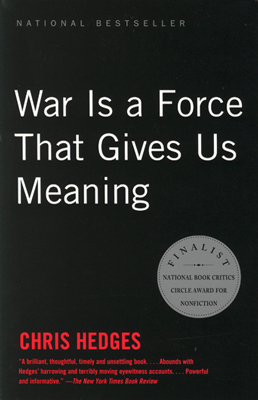I finished reading this book last week and now recommend it to you.
War is appalling. How can war (or, one step removed, war imagery in literature, film, etc.) be also compelling?
Hedges bases his discussion upon the unspoken assumption that meaning in each moment must be created by the individual—and that task of creation can be frequently overwhelming. That said, the following excerpt seems to me a suitable thesis for the book:
"Lurking beneath the surface of every society, including ours, is the passionate yearning for a nationalist cause that exalts us, the kind that war alone is able to deliver. It reduces and at times erases the anxiety of individual consciousness. We abandon individual responsibility for a shared, unquestioned communal enterprise, however morally dubious" (45).
Drawing from literature and his own experiences as a war correspondent, Hedges reflects upon the search for meaning gone awry from which war results and which war, in turn, causes. Hedges asserts that neither meaning so desired nor happiness frequently discussed and pursued are ends unto themselves:
"We are tempted to reduce life to a simple search for happiness. Happiness, however, withers if there is no meaning. The other temptation is to disavow the search for happiness in order to be faithful to that which provides meaning. But to live only for meaning—indifferent to all happiness—makes us fanatic, self-righteous, and cold. It leaves us cut off from our own humanity and the humanity of others. We must hope for grace, for our lives to be sustained by moments of meaning and happiness, both equally worthy of human communion" (159).
As with any good book, I'm left with potent questions. For example, as an artist, what do I hope to communicate via violent imagery?
Link to Powell's listing for War Is a Force That Gives Us Meaning


No comments:
Post a Comment